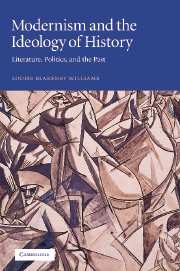Book contents
- Frontmatter
- Contents
- Acknowledgements
- Abbreviations
- Introduction
- 1 “Immaterial pleasure houses”: the initial aesthetic dilemma
- 2 “A more dream-heavy hour”: medievalist and progressive beginnings
- 3 “Pedantry and hysteria”: contemporary political problems
- 4 “A certain discipline”: radical conservative solutions
- 5 “A particularly lively wheel”: cyclic views emerge
- 6 “Our own image”: the example of Asian and non-Western cultures
- 7 In “the grip of the … vortex”: the proof of Post-Impressionist art
- 8 The “cycle dance”: cyclic history arrives
- 9 “The Nightmare” and beyond: the First World War and mature cyclic theories
- Conclusion
- Notes
- Index
4 - “A certain discipline”: radical conservative solutions
Published online by Cambridge University Press: 22 September 2009
- Frontmatter
- Contents
- Acknowledgements
- Abbreviations
- Introduction
- 1 “Immaterial pleasure houses”: the initial aesthetic dilemma
- 2 “A more dream-heavy hour”: medievalist and progressive beginnings
- 3 “Pedantry and hysteria”: contemporary political problems
- 4 “A certain discipline”: radical conservative solutions
- 5 “A particularly lively wheel”: cyclic views emerge
- 6 “Our own image”: the example of Asian and non-Western cultures
- 7 In “the grip of the … vortex”: the proof of Post-Impressionist art
- 8 The “cycle dance”: cyclic history arrives
- 9 “The Nightmare” and beyond: the First World War and mature cyclic theories
- Conclusion
- Notes
- Index
Summary
The future condition of man, then, will always be one of struggle and limitation. The best results can only be got out of man as the result of a certain discipline which introduces order into this internal anarchy … Nothing is bad in itself except disorder; all that is put in order in a hierarchy is good.
T.E. Hulme, “A Tory Philosophy,” April 3, 1912.In February of 1910 Ford Madox Ford made an astonishing statement: “I find myself wondering whether if the Deity were really beneficent, He would not send us a slaughter, famine or a pestilence that would sweep away all [the] … purposeless populations.” He continued, “I should like to see legislation introduced which would press hard upon, which would exterminate, all the purely parasitic classes.” A similar sentiment was expressed by D.H. Lawrence in 1912 when he concluded a tirade about the people of Britain with the comment: “God how I hate them! God curse them, funkers. God blast them, wish-wash. Exterminate them slime.” It should be obvious that at least two of the five Modernists were extraordinarily disillusioned by the majority of the population among whom they lived. Although these are the two most extreme statements any made, they do illustrate a hostility common to all five authors.
However, the Modernists did not just express their discontent. They also began to speculate on preferable political and social systems.
- Type
- Chapter
- Information
- Modernism and the Ideology of HistoryLiterature, Politics, and the Past, pp. 74 - 90Publisher: Cambridge University PressPrint publication year: 2002



